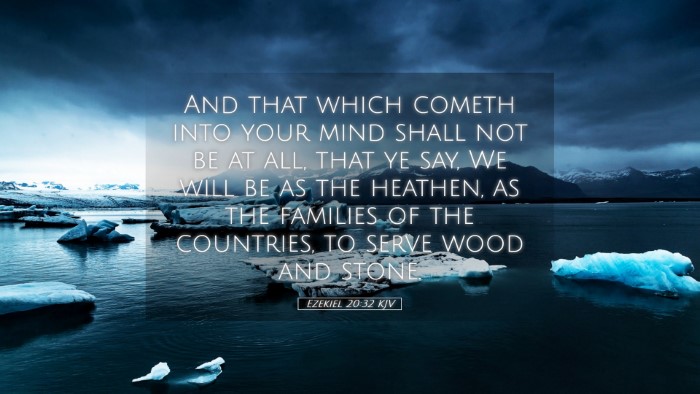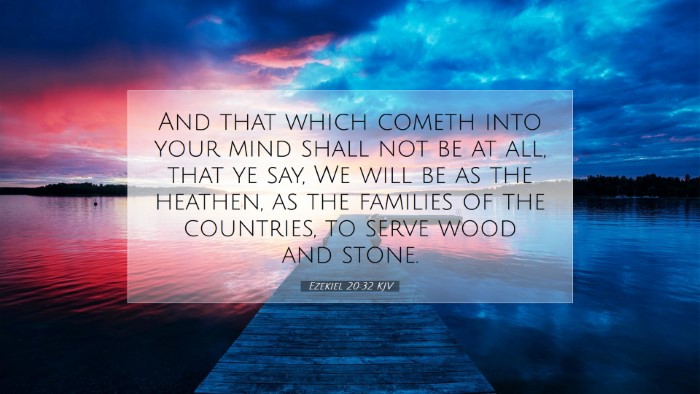Ezekiel 20:32 - Commentary and Insights
Bible Verse: "And that which cometh into your mind shall not be at all: that ye say, We will be as the heathen, as the families of the countries, to serve wood and stone."
Introduction
The verse Ezekiel 20:32 encapsulates a significant warning from God to His people concerning their desires and intentions. The context of this scripture is crucial for understanding the theological implications and the historical situation of Israel at the time. Through insights derived from respected public domain commentaries, we will explore the multifaceted meanings and applications of this verse.
Contextual Analysis
The book of Ezekiel is characterized by a prophetic call to Israel during a time of exile. The implications of idolatry and the mixing of worship practices with pagan nations are central themes. To fully understand Ezekiel 20:32, we need to recognize the broader narrative and the specific grievances that God has with His people.
Historical Background
During Ezekiel's prophetic ministry, Israel faced severe consequences due to their persistent idolatry. The people harbored aspirations of returning to the ways of the nations around them, desiring to adopt their customs and worship practices. This desire was a direct affront to God, who had called Israel to be a distinct people.
Theological Insights
Ezekiel 20:32 serves as a critical reminder of the dangers of conforming to the world. The imagery of “wood and stone” refers to the idols that represented the common practices of the surrounding cultures. The dire warning encapsulated in this verse can be summarized in several key theological themes:
- Idolatry: The desire to serve “wood and stone” reflects a heart that is enticed by the immediate and tangible, forsaking the invisible and eternal God.
- Divine Sovereignty: God states that the intentions of the people will not come to fruition, illustrating His sovereign control over human plans and desires.
- Judgment and Restoration: This verse not only conveys a judgment on their intentions but also foreshadows the hope of eventual restoration when they return to Him.
Commentary Insights
Matthew Henry
Henry emphasizes that the people’s thoughts and intentions are not hidden from God. He highlights that the phrase “that which cometh into your mind” underscores the internal rebellion against God’s covenant. The desire to align with the practices of the heathen nations is a profound indication of spiritual decline.
Albert Barnes
Barnes notes that this verse illustrates the folly of the Israelites in thinking that they could find safety and fulfillment outside of God’s covenant. He argues that their aspirations to serve idols were rooted in a misunderstanding of their identity as God's chosen people. Barnes asserts that God's response is a declaration of His inability to allow such idolatry to corrupt His covenant people.
Adam Clarke
Clarke provides a more pastoral approach, observing that this verse serves as a stark reminder to modern believers about the dangers of spiritual compromise. He explains that the longing to serve “wood and stone” represents any form of attachment that distracts from genuine worship of God. Clarke encourages readers to examine their own lives for any modern idols that might be vying for their allegiance.
Practical Applications
For pastors, students, and theologians, Ezekiel 20:32 serves as an essential text for exploring themes of fidelity to God, the nature of idolatry, and the implications of divine sovereignty over human desires. Here are some practical applications:
- Examine Personal Idolatry: Encourage self-reflection on what modern “idols” may be present in one’s life—anything that takes precedence over a relationship with God.
- Teach Distinctiveness: Emphasize the importance of remaining distinct as believers in a culture that often conflicts with biblical teaching.
- Offer Hope: While this verse serves as a warning, it also opens the door to discussions about restoration and the loving nature of God, who desires His people to return to Him.
Conclusion
Ezekiel 20:32 is a potent reminder of the human tendency towards compromise and the allure of idolatry. Through the insights gleaned from canonical commentaries, we discover the depth of God’s intentions and His unwavering commitment to His people. As we reflect on this verse, may we strive to align our hearts with God, recognizing His sovereignty in our lives and resisting the temptations to adopt practices that lead us away from our true purpose as His followers.


